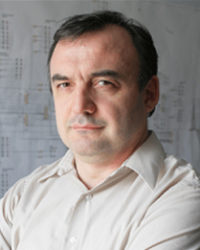Vanderbilt researchers lengthen software-development efforts
[ad_1]
Gabor Karsai, professor {of electrical} engineering, laptop science and laptop engineering at Vanderbilt College, is main a $2.5 million mission to develop superior software program to handle microgrids, the comparatively small vitality programs that depend on native vitality technology and storage. This newest effort marks the continuation of an earlier mission with the U.S. Division of Vitality’s Superior Analysis Tasks Company-Vitality (ARPA-E).

Vitality administration, whether or not in large-scale distribution programs or smaller microgrids, requires a excessive degree of precision, involving complicated laptop controls and logic. Moreover, microgrids programs are sometimes very totally different. Karsai and his staff, which incorporates collaborators from North Carolina State College, are constructing software program that’s extremely customizable. This flexibility will allow efficient vitality administration throughout microgrids in quite a lot of environments starting from army amenities that require dependable energy sources in distant areas to communities with sustainability applications.
“Microgrids usually are very inexperienced sources of vitality, and are of curiosity to organizations trying to improve their sustainability initiatives or lower their reliance on the principle energy grid,” mentioned Karsai, who can be affiliate director of the Vanderbilt Institute for Software program Built-in Techniques. “The issue is that microgrids don’t have the identical big sources, like massive turbines, that current vitality firms have. There must be a greater solution to handle the vitality that’s captured by microgrids with a purpose to maximize its potential, which is what we intention to do with this mission.”
Karsai’s staff is exploring algorithms supposed to handle numerous management and vitality administration features. For instance, when coping with a variable renewable vitality supply like wind, programs should have the ability to keep away from an vitality overload or mismatch between technology and consumption. With out that stability, all the grid can collapse.
“These calculations must be exact, and constructing these algorithms is sort of difficult,” Karsai mentioned. “We’re growing strategies to handle excessive velocity and unpredictable occasions which have main impacts on the grid.”
The software program the staff has already developed is open supply, a format the group intends to comply with on this mission. “We’d like anybody to make use of the software program that we develop,” Karsai mentioned. “This can be a analysis prototype, not business, however we hope that it turns into ok that different individuals can construct on it and develop it additional.”
Over the course of the mission, the Institute will check its software program in collaboration with N.C. State researchers engaged on energy programs. Preliminary experiments of the microgrid administration software program shall be carried out at N.C. State, adopted by later experiments at nationwide lab amenities.
Funding for this mission is offered over the following two years by the Environmental Safety Expertise Certification Program of the Division of Protection.
[ad_2]
Supply hyperlink